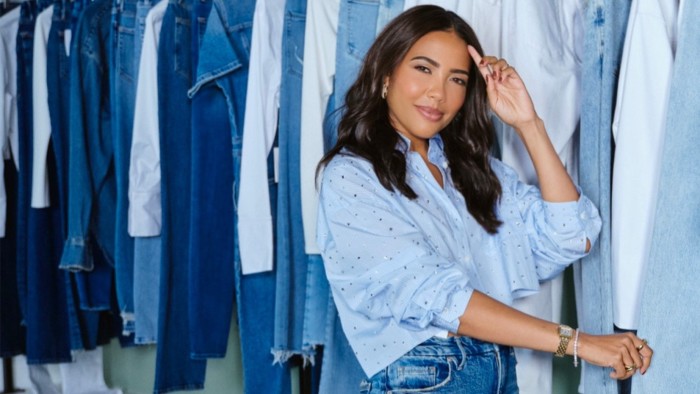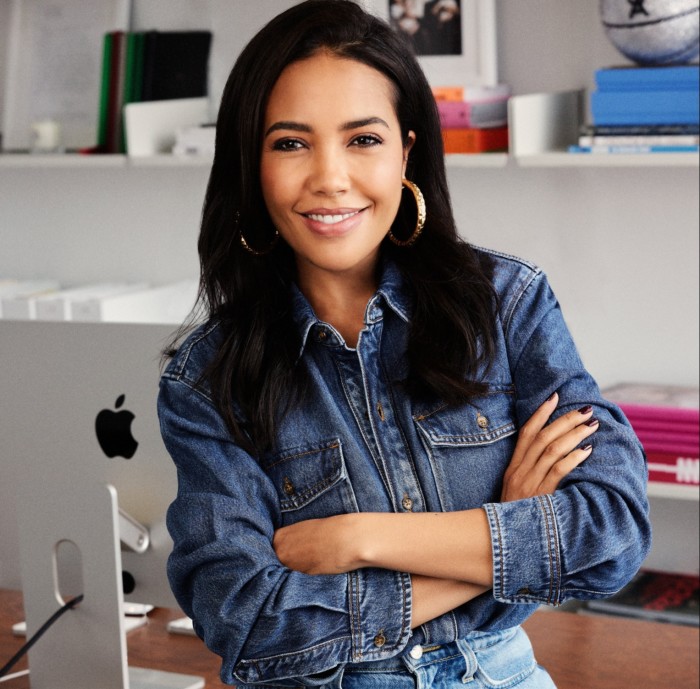Skims co-founder Emma Grede: ‘I’m trying to create a pathway for people like me’

Roula Khalaf, Editor of the FT, selects her favourite stories in this weekly newsletter.
Emma Grede feels a need to apologise. “Sorry!” she jokes, acknowledging her fast-expanding public profile. “Yeah, there’s been a lot of me.”
That includes her appearances on TV entrepreneur shows such as ABC’s Shark Tank, BBC’s Dragons’ Den, and Roku’s Side Hustlers. But that ubiquity is all the co-founder of two of the biggest brands in the billion-dollar Kardashian empire is going to express remorse over.
Instead, she sees her success, built over two decades, as a direct result of being true to who she is.
“I realised, really early on, that being a Black woman, being somebody who didn’t go to university, and seeing things the way I do was an advantage for me in business,” says Grede, speaking via videocall from the headquarters of her inclusive jeans brand Good American in Los Angeles — where she lives with her entrepreneur husband Jens Grede and their four children. “That was a part of my superpower.”
The 41-year-old chief executive and co-founder of Good American, and co-founder of shapewear label Skims, was raised in east London and dropped out of the London College of Fashion because she could not afford to study full-time.
So, armed with a dogged work ethic, a gift for negotiating deals, and an entrepreneurial instinct, she turned an interest in fashion into a multimillion-dollar fortune. That meant “taking the opportunities that have presented themselves to me and then weaving those into gold”, she says.
Career Timeline
1982 Emma Grede (née Findlay) born in east London, the eldest of four sisters
2001 Drops out of the London College of Fashion
2008 Sets up ITB Worldwide and builds it into one of Europe’s leading entertainment marketing agencies
2016 Good American launches and records $1mn sales on its first day
2020 Messages Aurora James after reading an Instagram post that led to the Fifteen Percent Pledge
2021 Joins Shark Tank as a guest judge and the first Black female investor
2022 Collects the Council of Fashion Designers of America (CFDA) inaugural innovation award on behalf of Skims
She set about leveraging every work opportunity that came her way, from shop worker to fashion show producer. In 2008, at the age of 26, she founded ITB, a London-based talent management and entertainment marketing business, with funding from Saturday Group, her now husband’s fashion marketing agency.
ITB brokered deals such as Natalie Portman’s relationship with luxury French fashion house Dior. Ten years later, global marketing and PR agency Rogers and Cowan acquired the business for an undisclosed sum.
By then, Grede had a deep understanding of the power to be won by pairing Hollywood A-listers with consumer products. But new classes of celebrity had emerged: influencers and reality TV stars with huge followings on social media, such as the Kardashian-Jenner sisters.
In 2015, during Paris Fashion Week, Grede pitched the idea of an inclusive denim brand — that would include plus and, later, “in between” sizes — to Kris Jenner, the family matriarch and manager, suggesting her daughter Khloe Kardashian as the ideal partner.
By 2016, Good American was born. This was followed in 2019 by Skims, which Grede co-founded with her husband Jens, who became chief executive, and Kim Kardashian. Then, in 2021, she launched Safely, a natural cleaning product company, with Kris Jenner.

Grede is proud both to have been among the first movers in celebrity branding, but also to have taken the idea further. Celebrities accelerate interest and brand recognition, she says, but the product must be special: “Customers are savvy, and we have so much choice now.”
With Good American — which is B-Corp certified, meaning it has verified commitments to environmental and social aims — Grede wanted to create jeans for a large range of body shapes. Similarly, Skims — where she is chief product officer and which was valued at $4bn in a fundraising round last year — embraces body positivity and its range of neutral colours complements a wide spectrum of skin tones.
This focus on inclusivity is a reflection of what she considers important in business, whether that concerns the product, leadership team, or employees. “If your leadership team doesn’t somehow represent the overall demographics of the customer you’re serving or the country you’re in . . . then you’re gonna have a really big problem over the long term.”
Grede has taken her commitment to diversity one step further as chair of the Fifteen Percent Pledge, an initiative started by Canadian fashion designer Aurora James after the murder of George Floyd in 2020.
The pledge encourages US retailers to dedicate 15 per cent of shelf space to Black-owned businesses because Black communities comprise that proportion of the US population. To date, the initiative has directed $14bn of revenue to those businesses. “We put literally hundreds of brands on the shelves of retailers that didn’t [previously] carry them. When you walk into a Sephora, for example, it looks entirely different to what it did three years ago,” she says. Other supporters include Ulta, Nordstrom and Macy’s, she adds.
“When [Black entrepreneurs] have that kind of support from those types of retailers, they’re able to attract financing, they’re able to attract the best staff,” she argues. “It immediately impacts them, their business, their families and the community.”
Grede, herself, is supported by “a small army” of helpers, who enable her to juggle parenting and a career, and to tackle day-to-day business problems. “Nobody tells me when everything’s working out all right,” she laughs.
But, recently, the response of people inspired by her story has led her to reflect more on the legacy she is building. On a trip to the UK in February, she spent time with pupils at her old secondary school, Woodbridge High School, in east London.
“Growing up, I didn’t even know what an investor was,” she says — having “no concept” of someone putting their own money into another person’s business. “And so I believe very, very strongly that [visibility] really matters,” she explains. “I’m trying to create a pathway for people like me, to be able to see what is possible and to be able to be in those rooms [where deals are done].”
Is Grede’s success a sign of an appetite to hear from people from under-represented backgrounds — women, in particular? “No,” she says. “I would love to say yes . . . but I actually think that everything changes — and [also] not much changes.”
She recounts a recent team outing and, when it came to picking up the bill, the waiter went round the table before realising it was Grede who would be paying. She says: “I think we have to be truthful and honest about what it takes [to succeed in business], but that shouldn’t diminish the idea that you deserve to be there.”

Comments